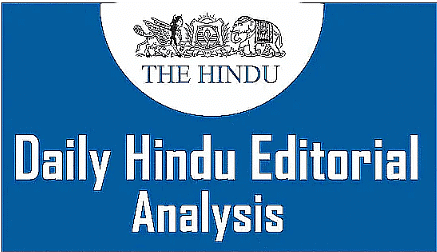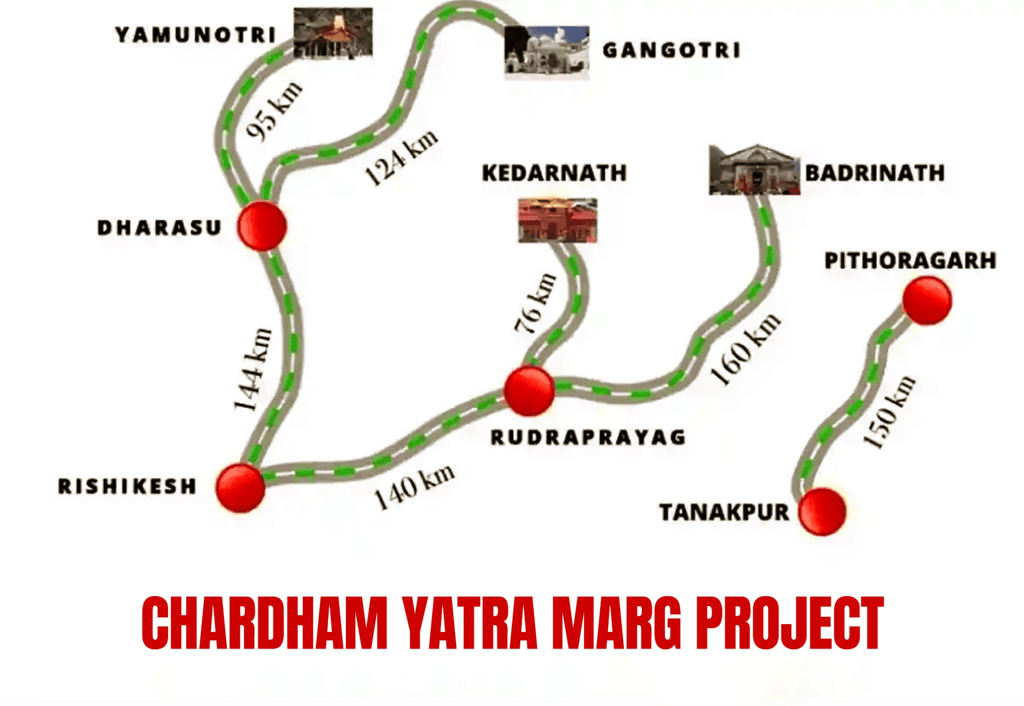The Hindu Editorial Analysis- 30th November 2023 | Current Affairs & Hindu Analysis: Daily, Weekly & Monthly - UPSC PDF Download

Rocky reminder
Why in News?
The 41 workers who were trapped for 17 days in the collapsed tunnel in Silkyara, Uttarakhand, were rescued after extensive efforts led by the National Disaster Management Authority.
About Silkyara Tunnel and Char Dham Project
- Silkyara tunnel: Silkyara tunnel is part of the ongoing construction between Silkyara and Dandalgaon on the Brahmakhal-Yamunotri stretch of the National Highway under the Char Dham project.
- Char Dham Project: Launched in December 2016, it aims to enhance connectivity between the four pilgrimage sites of Char Dham—Kedarnath, Badrinath, Yamunotri, and Gangotri.

Security and Sustainability Dilemma for India
- Chinese Infrastructure Development: China’s construction of roads and helipads along the Indo-China border presents security concerns for India.
- Strategic Importance of Double-Lane Roads: Double-lane roads are strategically needed for the swift movement of the armed forces.
- Development and power security: Hydel projects are necessary for this.
Why Is a Due Diligence Culture Needed?
- Unexpected geological challenges: Without thorough geological assessments, geological challenges lead to cost overruns, delays in timelines, and safety-related incidents.
- Toll on workers: The absence of pre-project due diligence leads to migrant workers facing heightened safety risks, while developers remain unaffected by financial consequences.
- Loss of Lives and Social Impact: The loss of lives and social consequences prompts a call for sustainable development with minimal environmental impact.
- Lack of culture of accountability and consequence: The absence of effective governance and the failure to draw insights from past disasters provide no precedent for guiding future projects.
Way Forward
- Prioritizing Safety: The safety of workers and the local population needs to be prioritised with due diligence conducted by independent expert teams before project initiation.
- Balancing Ecological Impact: The government should focus on development without compromising ecological balance or endangering the lives of project workers and local residents.
- Mitigating risks: For initiating developmental projects in seismic zones like the Himalayas, proper safety precautions can mitigate risks.
Conclusion
The collapse of the Silkyara Tunnel in Uttarakhand highlights the urgent need for a culture of due diligence, prioritizing safety, ecological balance, and risk mitigation in infrastructure projects, particularly in sensitive regions like the Himalayas.
A better model
Why in News?
The Model Code of Conduct (MCC) that parties and governments are expected to follow during election campaigning is well-meaning, but not easy to enforce. The MCC is largely dependent on the cooperation of parties and governments and the vigilance of the Election Commission of India (ECI).
What is a Model Code of Conduct and its objectives?
The Model Code of Conduct (MCC) is a set of norms and principles to guide the political parties and candidates during elections, evolved with the consensus of political parties to abide by the principles embodied in the said code and also binds them to respect and observe it in its letter and spirit.
- The Election Commission ensures observance of the MCC by a political party in power and contesting candidates for conducting free and fair elections under Article 324 of the Constitution of India.
- MCC also ensures that official machinery for electoral purposes is not misused. Further, it is also ensured that electoral offenses, malpractices, and corrupt practices are prevented by all means.
- The Model Code of Conduct is enforced from the date of announcement of the election schedule by the Election Commission and is operational till the process of elections is completed.
- During general elections to the Lok Sabha, the code is applicable throughout the country. During general elections to the Legislative Assembly of the state, the code is applicable in the entire State.
- During bye-elections, the Model Code of Conduct would be applicable in the area of the concerned Constituency only.
What is the historical background of the Model Code of Conduct?
The Model Code of Conduct (MCC) has its roots in the electoral history of India. It originated in the state of Kerala, and with time, it has evolved into the Model Code of Conduct (MCC).
- MCC traces its origins to the 1960 Assembly elections in Kerala, where a 'Code of Conduct' was prepared by the State Administration for political leaders.
- Subsequently, in the 1962 Lok Sabha elections, the Election Commission of India (ECI) circulated the code to all recognized political parties and State governments, which was generally followed.
- However, to address the issue of corrupt electoral practices, using muscle power and money from 1962 to 1991, the ECI refined the code, adding a section to regulate the 'party in power' and prevent it from gaining an unfair advantage during elections.
- The code was renamed the MCC and made more stringent, but despite demands that it be incorporated into the law, no such legislation was passed.
- After 1991, the ECI enforced the MCC using new means, and in cases of violation, the Chief Election Commissioner T.N. Seshan exercised constitutional power under Article 324 to postpone elections.
- In 2013, the Supreme Court directed the Election Commission to include guidelines on election manifestos in the MCC, which were subsequently included in the code for the 2014 general elections.
What are the significant provisions of the Model Code of Conduct?
The Model Code of Conduct (MCC) in India has several significant provisions, including
- General conduct: No party or candidate shall include itself in any activity which may aggravate existing differences or create mutual hatred or cause tension between different castes and communities, religions, or linguistic groups.
- Criticism of other political parties shall be confined to their policies and programs, past record, and work.
- Places of worship such as temples, mosques, and churches should not be utilized for election propaganda.
- The right of every citizen to a peaceful and undisturbed home life should be respected, and campaigning in any area should only be conducted with permission from the concerned individual or organization.
- Meetings: The party or candidate must notify the local police authorities about the proposed venue and time of a meeting well in advance to ensure that the police can maintain law & order, and peace.
- Procession: It is necessary to inform the local police or relevant authorities about the time, venue, and route of a procession well in advance so that the necessary arrangements can be made.
- Polling Day: The party or candidate should collaborate with the authorities at the polling booths to ensure peaceful elections. There should be no distribution of food or alcohol outside the polling stations.
- Polling booth: Only individuals with a valid pass from the Election Commission are allowed to enter the polling booths, aside from the voters.
- Observers: The Election Commission appoints observers, who can be notified by candidates or their agents if they have any particular complaints or issues regarding the conduct of the elections.
- Party in power: The ruling party, whether at the central or state level, must ensure that there is no cause for complaint that it has exploited its official position for its election campaign.
- Election manifesto: The election manifesto shall not contain anything repugnant to the ideals and principles enshrined in the Constitution, and further that it shall be consistent with the letter and spirit of other provisions of the Model Code of Conduct.
What are the different issues pertaining to the Model Code of Conduct?
There have been several issues and controversies surrounding the Model Code of Conduct (MCC) in India. Some of these include
- Enforcement: The MCC is not enforceable by law, and the lack of legal backing for the MCC raises questions about its effectiveness and the ability of the Election Commission to ensure a level playing field for all candidates.
- New forms of electoral malpractice: With the development of technology and social media, new forms of electoral malpractice have emerged, including using these tools for voter bribery and manipulation.
- Weak response and delayed action: ECI's capacity for response to inappropriate statements by powerful political actors has been weak or delayed. Hence, political actors are regaining the confidence to flout the MCC without facing the consequences.
- Lack of power to disqualify candidates: The Election Commission does not have the power to disqualify candidates who commit electoral malpractices. At best, it may direct the registration of a case.
- Inability to de-register political parties: The ECI does not have the power to deregister any political party for electoral violations. This raises concerns about the accountability of political parties and the lack of consequences for their actions.
What are the reforms suggested for the effective functioning of the MCC?
Some measures for effective implementation of the Model Code of Conduct include
- Legal enforcement: The Standing Committee on Personnel, Public Grievances, Law and Justice recommended in 2013 that the Model Code of Conduct be made legally binding and be included as a component of the Representation of the People Act, 1951.
- Enforcement through other measures: The MCC cannot be enforced by law directly, but its certain provisions can be implemented by invoking other legal provisions like the Indian Penal Code of 1860, Code of Criminal Procedure of 1973, and Representation of the People Act of 1951.
- Law Commission recommendation (2015): The ruling party generally releases government-sponsored advertisements highlighting its achievements before the announcement of MCC, which gives it an unfair advantage over other parties and candidates.
- The Law Commission thus suggested imposing a ban on such advertisements for up to six months before the expiry of the House/Assembly to ensure a level playing field for all.
- Use of technology: Technology-based resources, such as AI-based systems, can be utilized to prevent violations of MCC through social media platforms.
- Independence of ECI: The Election Commission should be granted greater independence similar to the Comptroller and Auditor General (CAG) to enable it to take more stringent actions for the implementation of MCC.
|
38 videos|5288 docs|1117 tests
|





















